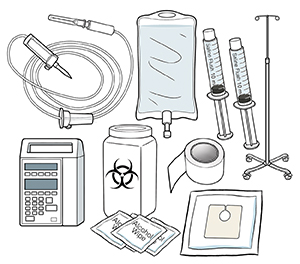A
B
C
D
E
F
G
H
I
J
K
L
M
N
O
P
Q
R
S
T
U
V
W
X
Y
Z
Topic IndexLibrary Index
Click a letter to see a list of conditions beginning with that letter.
Click 'Topic Index' to return to the index for the current topic.
Click 'Library Index' to return to the listing of all topics.
Home Infusion Therapy: Checking Your Supplies
A nurse will show you how to set up your home infusion system. Once you know what to do, treatment will become part of your daily routine. Use the checklist below to make sure you have all the things you need. If anything is missing or damaged, call the supply company right away.

With infusion therapy, medicines or fluids are given by IV (intravenously). They flow through a flexible tube (catheter) that’s placed in a vein—usually on your arm or chest.
☐ Bag or bottle
Your healthcare provider prescribes your medicine or fluid. It comes in a bag, or sometimes in a bottle. Be sure to store it as directed on the package. Look at the container. Don't use it if there's any fluid leaking or a break in the seal.
☐ Pole or hook
The bag or bottle hangs on a pole or on a hook on the wall. Hanging the bag above the IV catheter level lets gravity help the medicine or fluid flow into the tubing.
☐ Tubing
Clear plastic tubing carries the medicine or fluid from the bag or bottle to the catheter in your arm or chest.
☐ Pump or clamp
A pump, clamp, or dial-a-flow device controls how fast the medicine or fluid flows through the tubing. You can adjust a clamp or flow device by hand as you are shown. A pump is set for the correct flow rate. Never change the flow rate unless the healthcare provider or nurse tells you to do so.
☐ Needles and syringes
You insert the tubing into the catheter with a needle or a valve. Before and after treatment, you flush the catheter with a syringe full of saline solution.
☐ Dressing and tape
The catheter is covered with a sterile dressing to help prevent infection. Tape holds the dressing and the tubing in place. Keep the dressing clean and dry.
☐ Alcohol swabs
To prevent bloodstream infections, your catheter opening should be cleaned with an antiseptic solution. Do this before using it to draw blood or give medicines or fluids.
☐ Sharps container
Used needles and syringes must be put in a sharps container. This helps prevent punctures and the spread of infection.
Online Medical Reviewer:
Marianne Fraser MSN RN
Online Medical Reviewer:
Rita Sather RN
Online Medical Reviewer:
Susan K. Dempsey-Walls RN
Date Last Reviewed:
11/1/2023
© 2000-2025 The StayWell Company, LLC. All rights reserved. This information is not intended as a substitute for professional medical care. Always follow your healthcare professional's instructions.